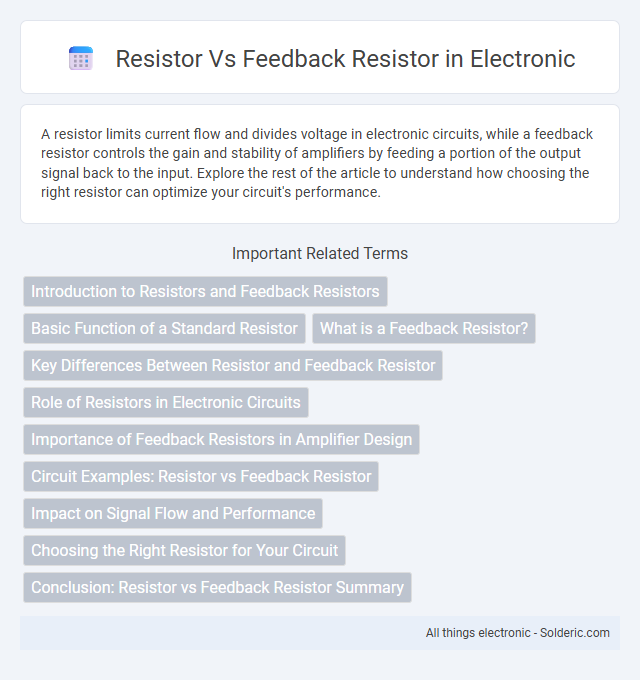A resistor limits current flow and divides voltage in electronic circuits, while a feedback resistor controls the gain and stability of amplifiers by feeding a portion of the output signal back to the input. Explore the rest of the article to understand how choosing the right resistor can optimize your circuit's performance.
Comparison Table
| Feature | Resistor | Feedback Resistor |
|---|---|---|
| Purpose | Limits current, divides voltage | Controls gain in amplifier circuits |
| Placement | Anywhere in circuit | Connected from output to input (feedback loop) |
| Function | General resistance to current flow | Sets feedback ratio, stabilizes gain |
| Common Use | Current limiting, biasing | Operational amplifier gain control |
| Effect on Circuit | Affects current and voltage levels | Determines amplifier stability and performance |
| Design Consideration | Resistance value to meet current/voltage needs | Precise value for desired gain and feedback |
Introduction to Resistors and Feedback Resistors
Resistors regulate current flow and voltage within electronic circuits by providing precise resistance values, essential for controlling signal levels and power dissipation. Feedback resistors specifically operate within feedback loops of amplifiers and control systems, determining gain stability and circuit response accuracy by feeding a portion of the output signal back to the input. Understanding the distinct roles of general resistors versus feedback resistors enables optimized design for accurate signal amplification and stable electronic circuit performance.
Basic Function of a Standard Resistor
A standard resistor primarily limits the current flow and divides voltage within an electrical circuit by providing a fixed resistance value, ensuring proper operation of components. Unlike a feedback resistor, which is used in amplifier circuits to control gain by feeding a portion of output signal back to the input, the basic resistor serves a straightforward role in managing electrical energy dissipation. Your circuit's performance relies on the precise resistance to maintain stability and prevent damage to sensitive components.
What is a Feedback Resistor?
A feedback resistor is a crucial component in electronic circuits, particularly in operational amplifier configurations, where it connects the output to the input to control gain and stability. Unlike a standard resistor that simply limits current or divides voltage, a feedback resistor determines the feedback loop characteristics, influencing the amplifier's frequency response and linearity. Its value directly affects the closed-loop gain, ensuring precise control over signal amplification and circuit performance.
Key Differences Between Resistor and Feedback Resistor
A resistor is a passive electrical component that limits current flow and adjusts signal levels in circuits, providing a fixed resistance value. A feedback resistor, specifically used in amplifier circuits, controls gain and stability by feeding a portion of the output signal back to the input. Unlike standard resistors, feedback resistors play a critical role in defining the behavior of operational amplifiers and other feedback systems.
Role of Resistors in Electronic Circuits
Resistors control current flow, divide voltage, and set operating conditions within electronic circuits. Feedback resistors specifically stabilize gain and improve linearity in amplifier circuits by feeding a portion of the output signal back to the input. Their precise resistance values are critical for maintaining circuit performance and preventing distortion.
Importance of Feedback Resistors in Amplifier Design
Feedback resistors play a crucial role in amplifier design by controlling gain stability and linearity, which directly impact signal fidelity. Unlike standard resistors that primarily limit current, feedback resistors regulate the amount of output signal fed back to the input, ensuring precise amplification and minimizing distortion. Optimizing these feedback components enhances your circuit's performance by maintaining consistent gain over various operating conditions.
Circuit Examples: Resistor vs Feedback Resistor
Resistors are basic circuit components used to limit current or divide voltage, often seen in series or parallel configurations such as voltage dividers or current limiters. Feedback resistors specifically appear in operational amplifier circuits, controlling gain and stability by feeding a portion of output signal back to the input, typically in configurations like inverting or non-inverting amplifiers. Your understanding of circuit behavior improves by recognizing that general resistors manage simple current flow, while feedback resistors precisely shape amplification characteristics within feedback loops.
Impact on Signal Flow and Performance
A resistor in a circuit primarily limits current and controls voltage levels, influencing signal amplitude and stability. A feedback resistor directly affects signal flow by determining the gain and frequency response in amplifiers or control systems, enhancing performance precision and stability. The choice and placement of feedback resistors optimize loop behavior, reduce distortion, and improve overall signal integrity in electronic designs.
Choosing the Right Resistor for Your Circuit
Selecting the right resistor for your circuit involves understanding the distinct roles of standard resistors and feedback resistors. Standard resistors primarily set current levels and voltage drops, while feedback resistors define gain and stability in amplifier circuits. Properly sizing your feedback resistor ensures precise control over signal amplification, enhancing overall circuit performance.
Conclusion: Resistor vs Feedback Resistor Summary
Resistors regulate current flow by providing a fixed resistance in electrical circuits, while feedback resistors play a critical role in controlling gain and stability in amplifier configurations. Feedback resistors create a feedback loop that adjusts output voltage based on input signals, enhancing accuracy and linearity in analog circuits. Understanding the distinct roles of general resistors versus feedback resistors is essential for optimizing performance in electronic designs.
resistor vs feedback resistor Infographic

 solderic.com
solderic.com